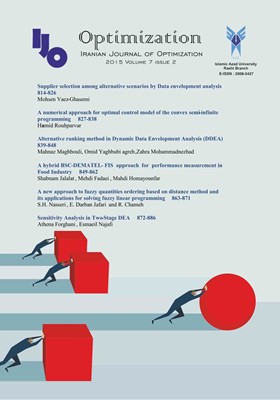Supplier selection among alternative scenarios by Data envelopment analysis
محورهای موضوعی : Data Envelopment Analysis
1 - Department of Mathematics, Islamic Azad University, Rasht Branch
کلید واژه: supply chain management, Data envelopment analysis, Mixed Integer Programming, Binary Variables,
چکیده مقاله :
A considerable problem in competitive trade world is choosing the best supply chain. As a result in much more serious circumstances of competitions looking for the best supplier for manufacturing, for preparing raw material, is very significant. Meantime suppliers have different scenarios to be fulfilled, such as changing selection variables like lead-time, transportation cost and transportation path. In this paper a mathematical model using Data Envelopment Analysis (DEA) technique and binary algorithm for selecting suppliers with different scenarios is used which can evaluate suppliers with variable preferences and replacement for other suppliers.A considerable problem in competitive trade world is choosing the best supply chain. As a result in much more serious circumstances of competitions looking for the best supplier for manufacturing, for preparing raw material, is very significant. Meantime suppliers have different scenarios to be fulfilled, such as changing selection variables like lead-time, transportation cost and transportation path. In this paper a mathematical model using Data Envelopment Analysis (DEA) technique and binary algorithm for selecting suppliers with different scenarios is used which can evaluate suppliers with variable preferences and replacement for other suppliers.
A considerable problem in competitive trade world is choosing the best supply chain. As a result in much more serious circumstances of competitions looking for the best supplier for manufacturing, for preparing raw material, is very significant. Meantime suppliers have different scenarios to be fulfilled, such as changing selection variables like lead-time, transportation cost and transportation path. In this paper a mathematical model using Data Envelopment Analysis (DEA) technique and binary algorithm for selecting suppliers with different scenarios is used which can evaluate suppliers with variable preferences and replacement for other suppliers.A considerable problem in competitive trade world is choosing the best supply chain. As a result in much more serious circumstances of competitions looking for the best supplier for manufacturing, for preparing raw material, is very significant. Meantime suppliers have different scenarios to be fulfilled, such as changing selection variables like lead-time, transportation cost and transportation path. In this paper a mathematical model using Data Envelopment Analysis (DEA) technique and binary algorithm for selecting suppliers with different scenarios is used which can evaluate suppliers with variable preferences and replacement for other suppliers.
[1]Charnes, A., W.W. Cooper, E. Rhodes, Measuring the efficiency of decision-making units, European Journal of Operational Research, 2, 1978, 429–444.
[2]FarzipoorSaen, R., Restricting weights in supplier selection decisions in the presence of dual-role factors, Applied Mathematical Modeling, 34, 2010, 2820–2830.
[3]FarzipoorSaen, R., Suppliers selection in the presence of both cardinal and ordinal data, European Journal of Operational Research, 183(2), 2007, 741–747.
[4]FarzipoorSaen, R., Supplier selection by the new AR-IDEA model, International Journal of Advance Manufacturing and Technology, 39(11–12), 2008, 1061–1070.
[5]FarzipoorSaen, R., M. Zohrehbandian, A data envelopment analysis approach for supplier selection in volume discount environments, International Journal of Procurement Management, 1(4), 2008, 472–488.
[6]FarzipoorSaen, R., Using data envelopment analysis for ranking suppliers in the presence of nondiscretionary factors, International Journal of Procurement Management, 2(3), 2009, 229–243.
[7]Gunasekarana, A., C. Patel, Ronald E. McGaughey, A framework for supply chain performance measurement, International Journal of Production Economics, 87, 2004, 333–347.
[8]Ho, W., X.Xu, P. K. Dey , Multi-criteria decision making approaches for supplier evaluation and selection: A literature review, European Journal of Operational Research, 202, 2010, 16–24.
[9]Kuosmanen, T., R. KazemiMatin, Theory of integer-valued data envelopment analysis, European Journal of Operational Research, 192, 2009, 658–667.
[10]Liu, J., F.Y. Ding, V. Lall, Using data envelopment analysis to compare suppliers for supplier selection and performance improvement, Supply Chain Management: an International Journal, 5(3), 2000, 143–150.
[11]Shin, H., D.A. Collier, D.D. Wilson, Supply management orientation and supplier/buyer performance, Journal of Operations Management, 18(3), 2000, 317–333.
[12]Talluri, S., R. Narasimhan, A. Nair, Vendor performance with supply risk: a chance-constrained DEA approach, International Journal of Production Economics, 100(2), 2006, 212–222.
[13]Thomas, D.J., Griffin, P.M., Coordinated supply chain management, European Journal of Operational Research, 94(3), 1996, 1–15.
[14]Toloo, M., S. Nalchigar, A new integrated DEA model for finding most BCC-efficient DMU, Applied Mathematical Modelling, 33, 2009, 597–604.
[15]Farhad Hosseinzadeh Lotfi, Golamreza Jahanshahloo, Mohsen Vaez-Ghasemi, and Zohreh Moghaddas, “Modified Malmquist Productivity Index Based on Present Time Value of Money,” Journal of Applied Mathematics, vol. 2013, Article ID 607190, 8 pages, 2013. doi:10.1155/2013/607190
[16]Weber, C.A., A data envelopment analysis approach to measuring vendor performance, Supply Chain Management, 1(1), 1996, 28–39.
[17]Zolghadri, M.,C.Eckert, S.Zouggar, P. Girard, Power-based supplier selection in product development projects, Computers in Industry, 62, 2011, 487–500.


